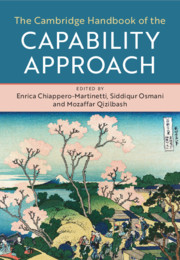Book contents
- The Cambridge Handbook of the Capability Approach
- The Cambridge Handbook of the Capability Approach
- Copyright page
- Dedication
- Contents
- Figures
- Tables
- Contributors
- Foreword
- Acknowledgements
- General Introduction
- Part I Historical Antecedents and Philosophical Debates
- Introduction to Part I
- 1 The Capabilities Approach and the History of Philosophy
- 2 Karl Marx and the Capabilities Approach
- 3 Utility and Capability
- 4 Intellectual History and Defending the Capabilities Approach
- 5 Sen, Smith and the Cambridge Tradition
- 6 The Capability Approach to Well-Being and Freedom from the Viewpoint of Welfare Economics and Social Choice Theory
- 7 Resources or Capabilities?
- 8 Taking Multidimensionality Seriously
- 9 The Capabilities Approach and Political Liberalism
- 10 Selecting a List
- 11 Individualism and the Capability Approach
- 12 The Politics of Wonder
- Part II Methods, Measurement and Empirical Evidence
- Part III Issues in Public Policy
- Index
- References
5 - Sen, Smith and the Cambridge Tradition
from Part I - Historical Antecedents and Philosophical Debates
Published online by Cambridge University Press: 11 November 2020
- The Cambridge Handbook of the Capability Approach
- The Cambridge Handbook of the Capability Approach
- Copyright page
- Dedication
- Contents
- Figures
- Tables
- Contributors
- Foreword
- Acknowledgements
- General Introduction
- Part I Historical Antecedents and Philosophical Debates
- Introduction to Part I
- 1 The Capabilities Approach and the History of Philosophy
- 2 Karl Marx and the Capabilities Approach
- 3 Utility and Capability
- 4 Intellectual History and Defending the Capabilities Approach
- 5 Sen, Smith and the Cambridge Tradition
- 6 The Capability Approach to Well-Being and Freedom from the Viewpoint of Welfare Economics and Social Choice Theory
- 7 Resources or Capabilities?
- 8 Taking Multidimensionality Seriously
- 9 The Capabilities Approach and Political Liberalism
- 10 Selecting a List
- 11 Individualism and the Capability Approach
- 12 The Politics of Wonder
- Part II Methods, Measurement and Empirical Evidence
- Part III Issues in Public Policy
- Index
- References
Summary
Sen considers Adam Smith an ally in the illustration of the logic of the capability approach — i.e. to be ‘able to appear in public without shame’ is a cross-cultural, cross-time capability, while the specific forms of consumption that it requires are variable. The chapter problematizes that Smith’s vision of the market and poverty is consistent with Sen’s. Sen uses that paragraph of The Wealth of Nations as an example of Smith’s general attitude towards wealth, commodities and the market, but such attitude is hard to find in Smith’s whole works. In particular, the chapter does not deny the legitimacy for Sen to quote that particular passage of Smith to show an illustrious antecedent of his capabilities approach. It claims that to have a full idea of Smith’s vision on necessities we need to consider Smith’s theory of the invisible hand, and that Smith’s general philosophy of the market is significantly different from Sen’s, as it emerges from the analysis of Smith’s general vision of commodities and luxury, and then enters into his theory of the market. Such an extension claims to contribute to a more general discussion on the connections between Sen’s and Smith’s vision of political economy.
- Type
- Chapter
- Information
- The Cambridge Handbook of the Capability Approach , pp. 92 - 105Publisher: Cambridge University PressPrint publication year: 2020



